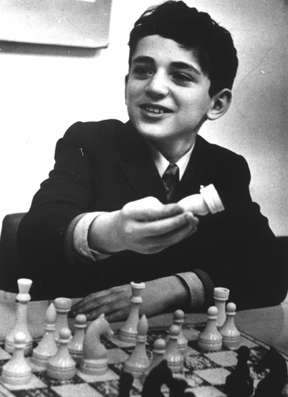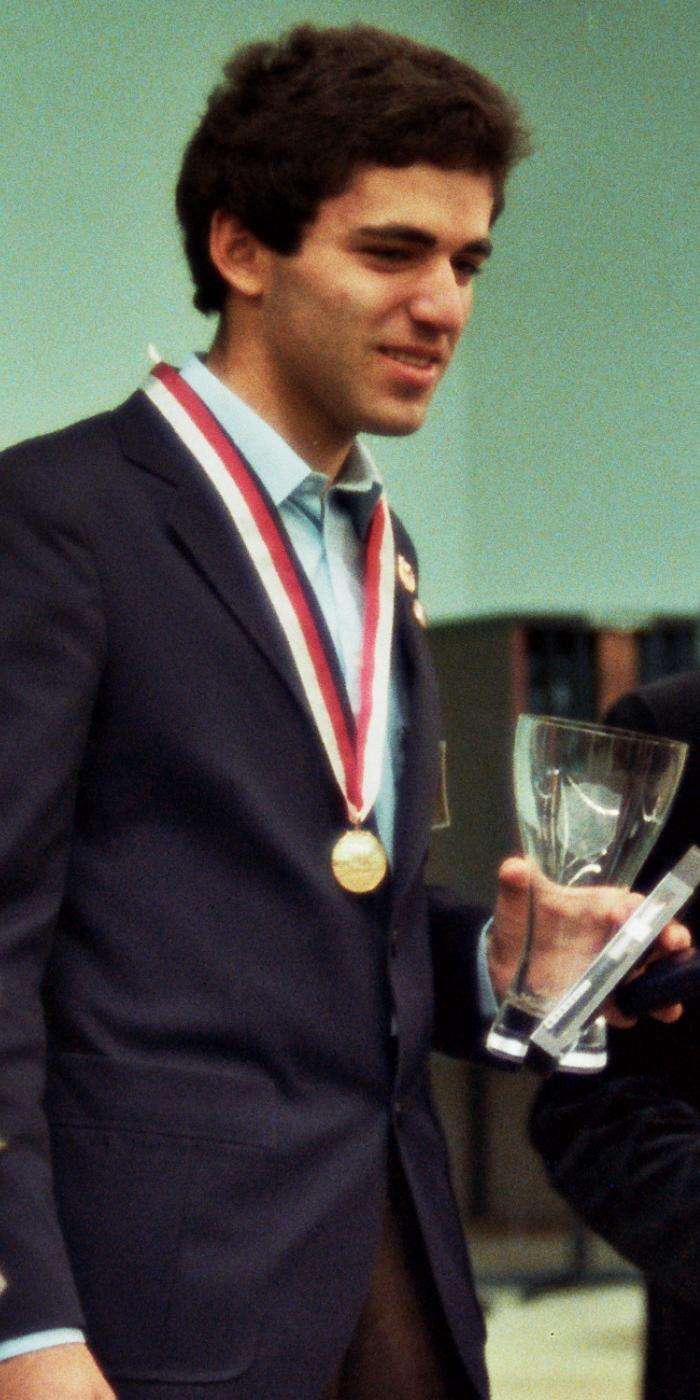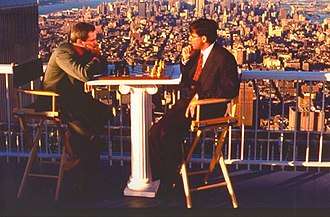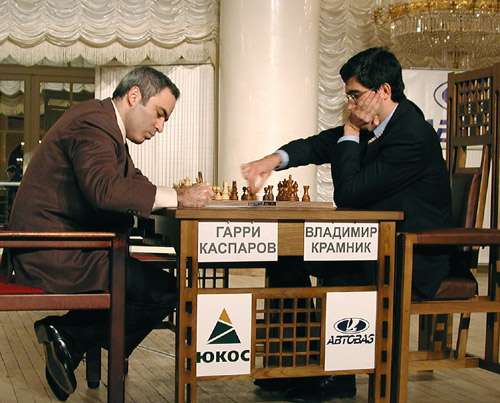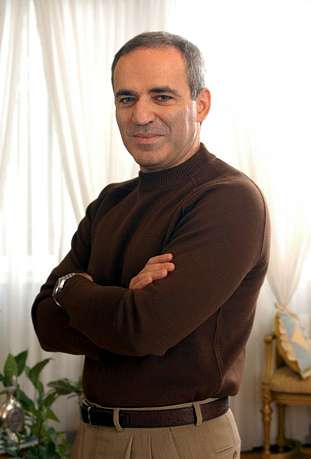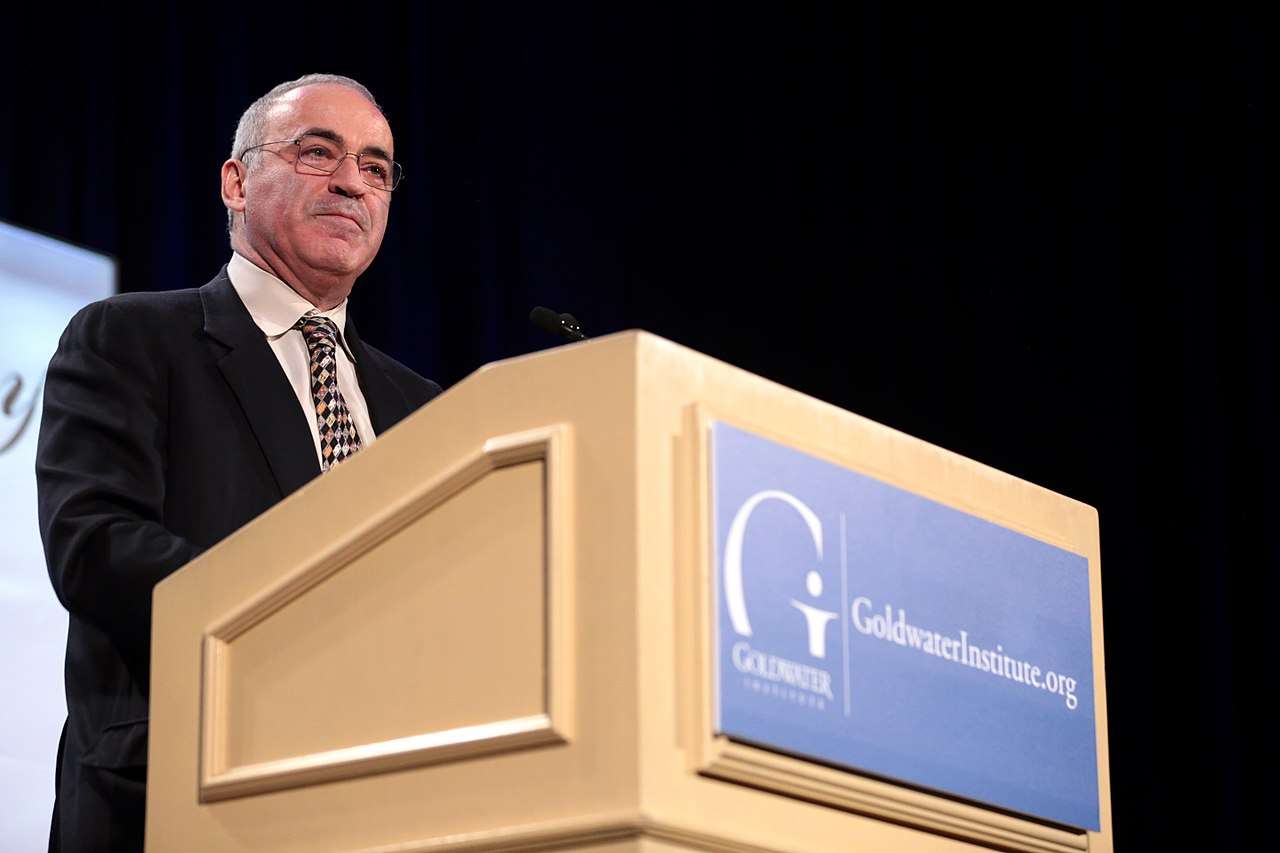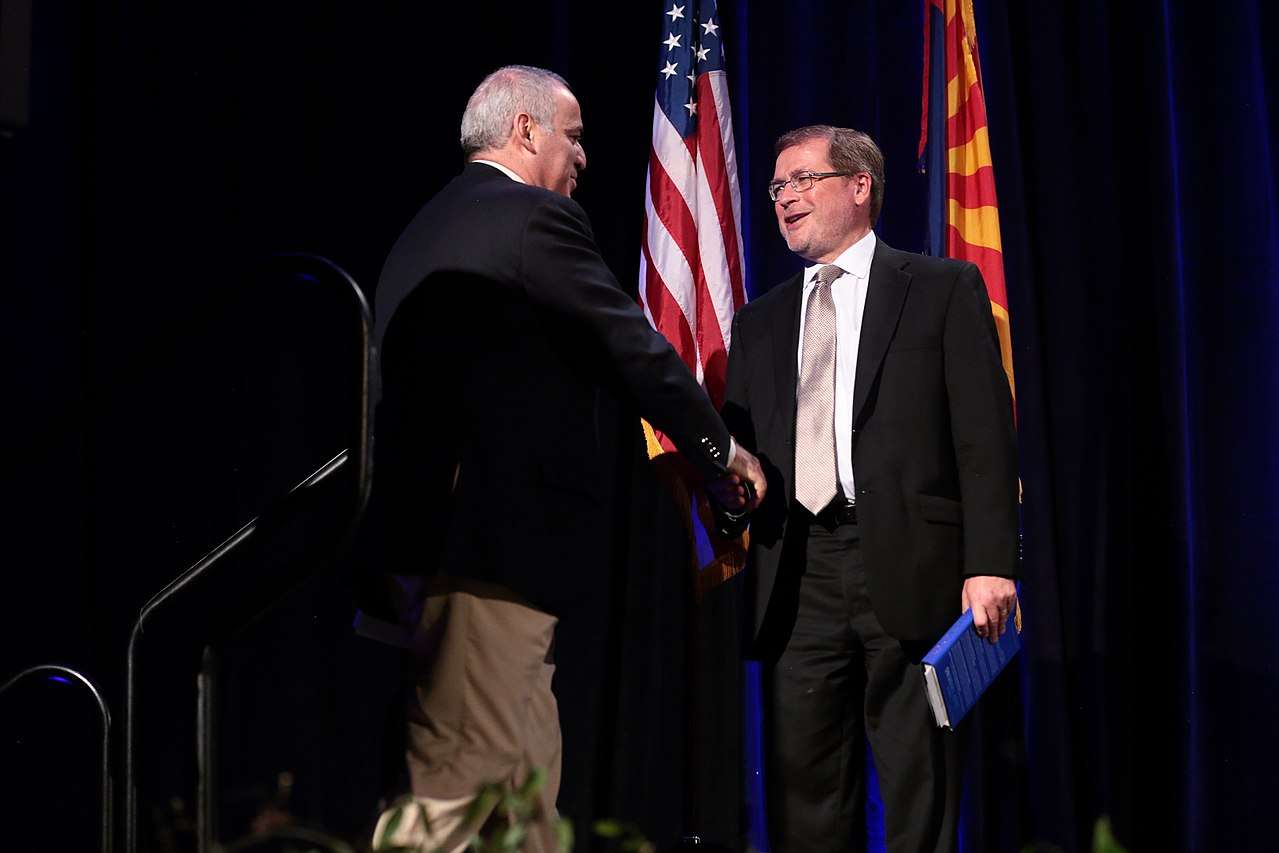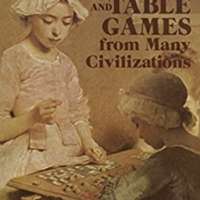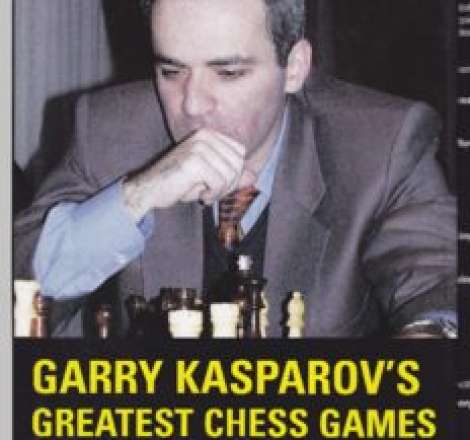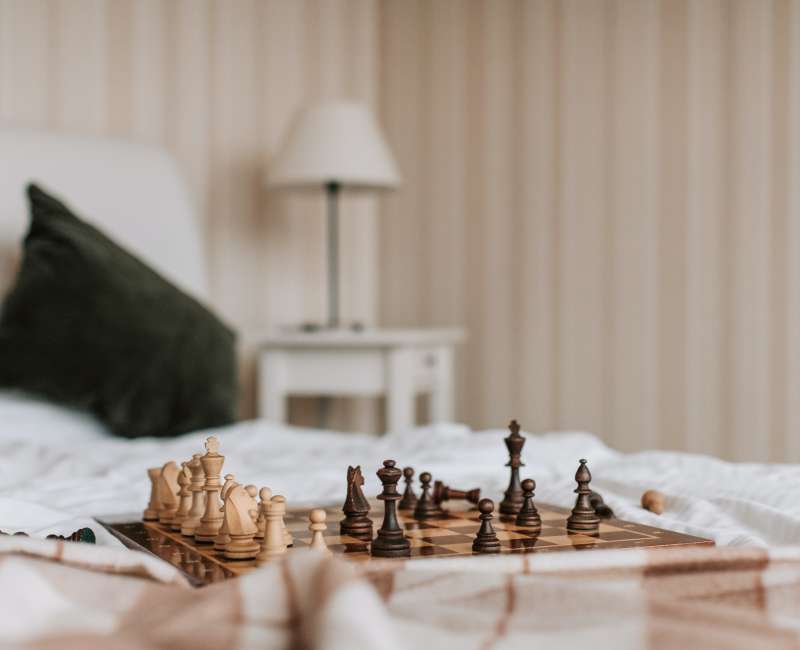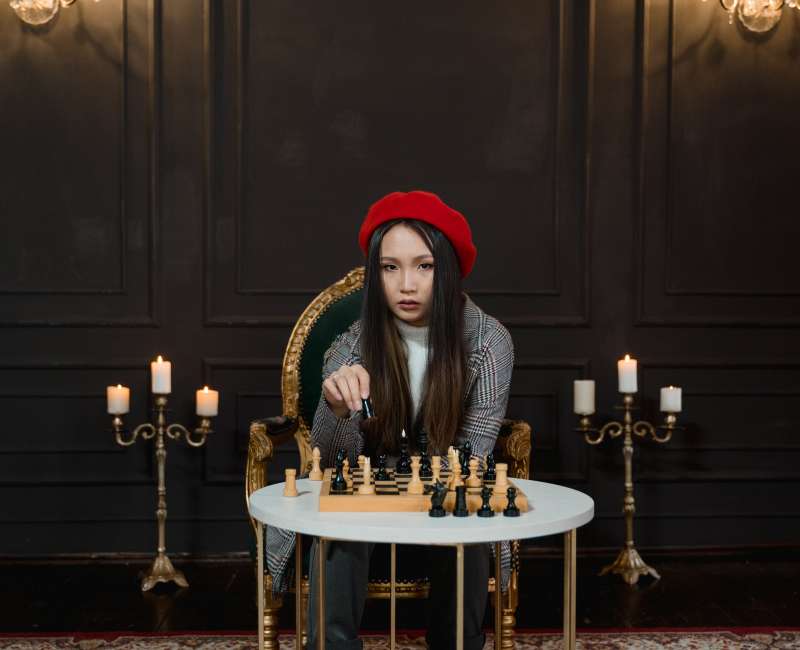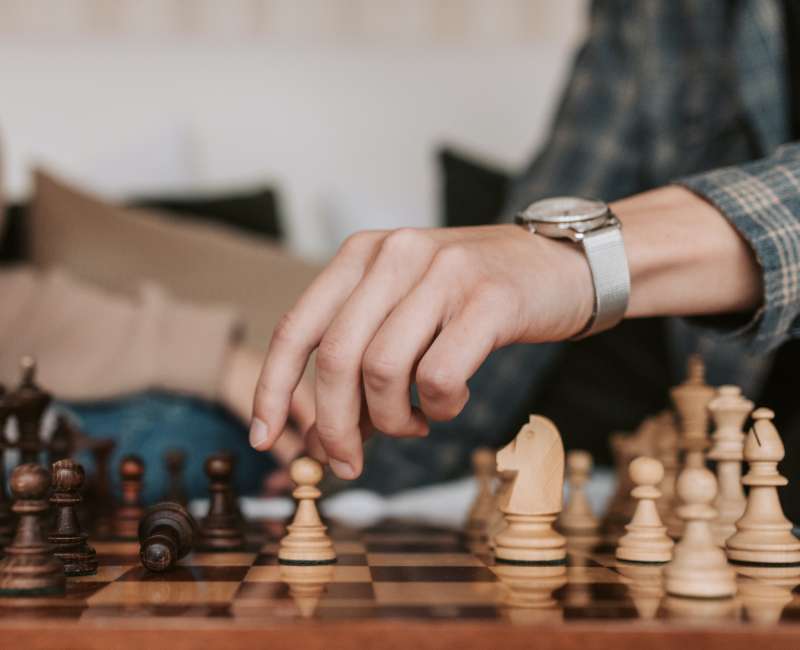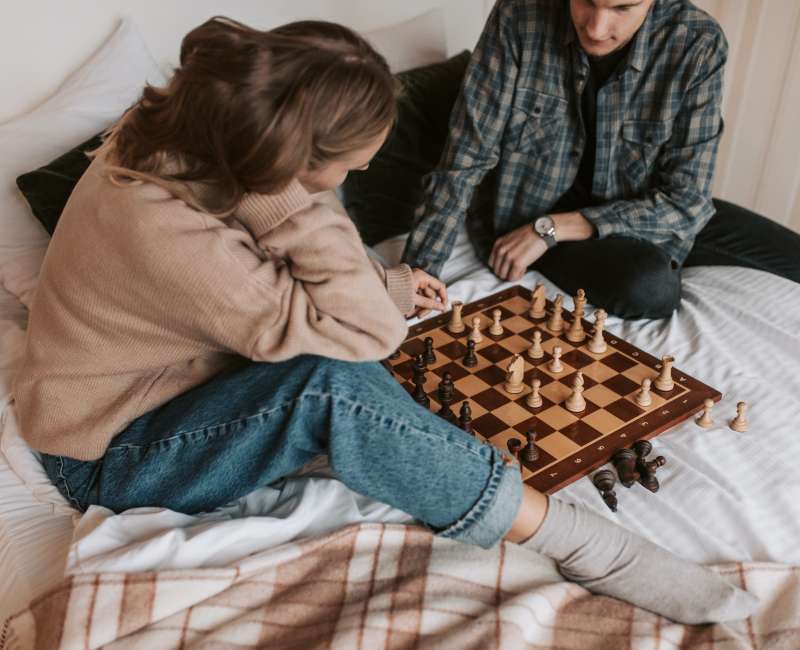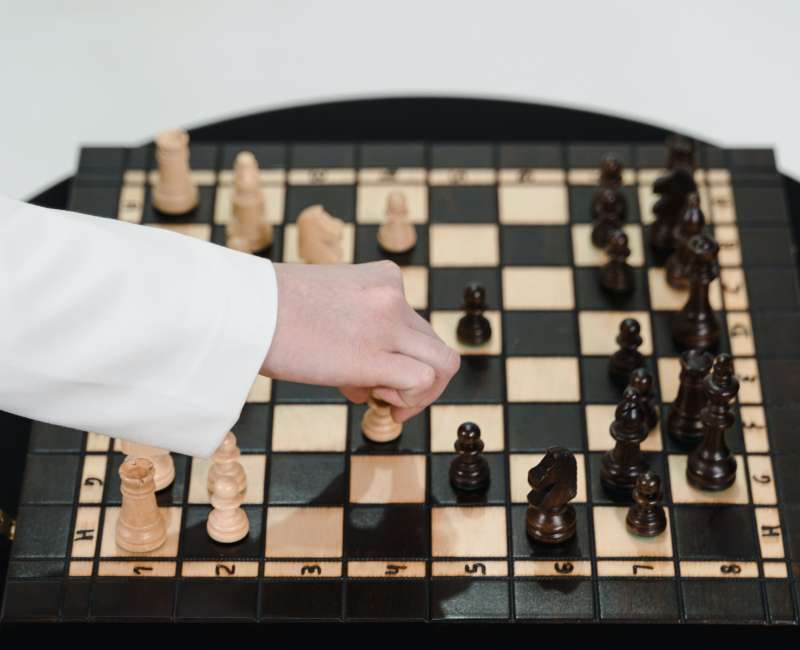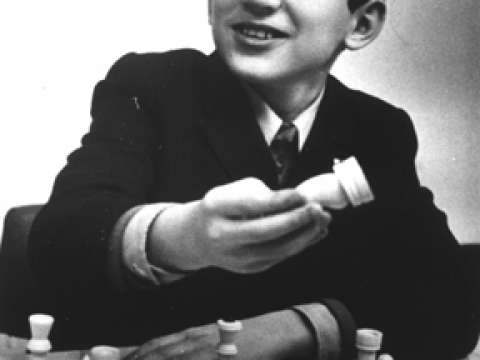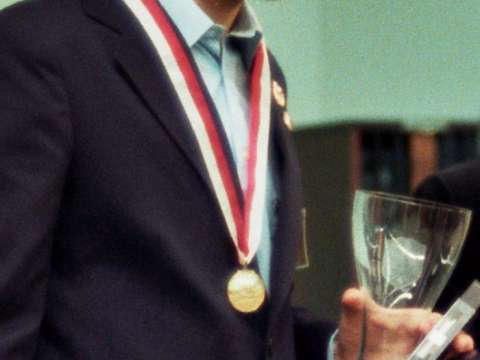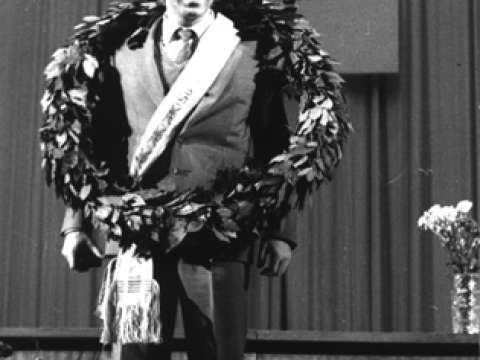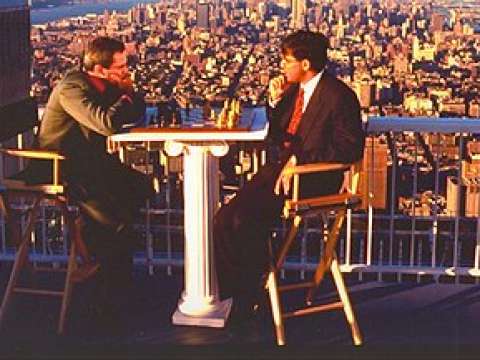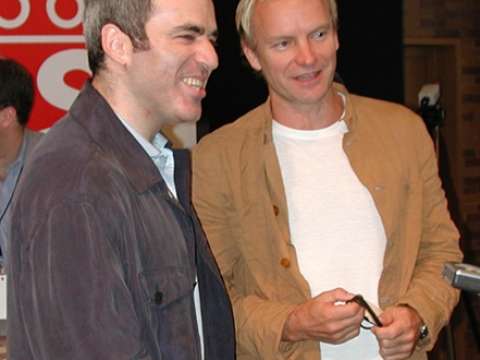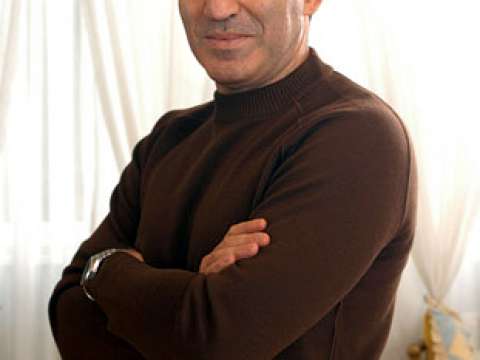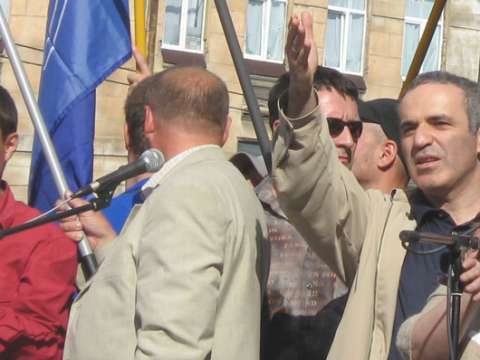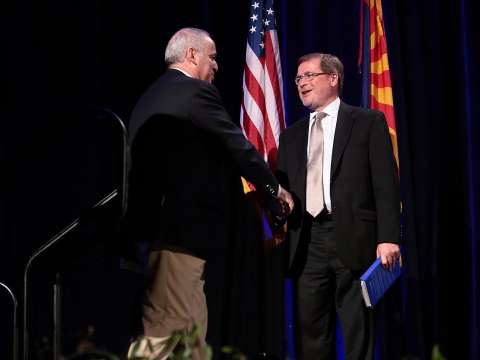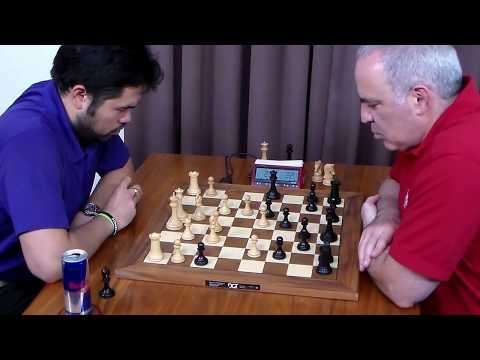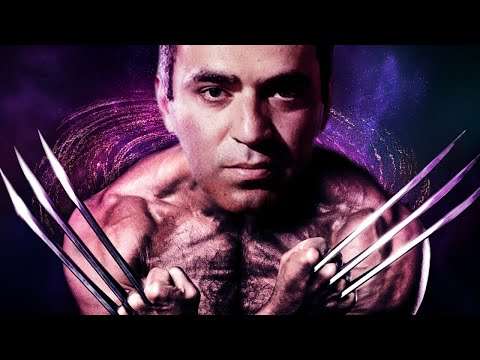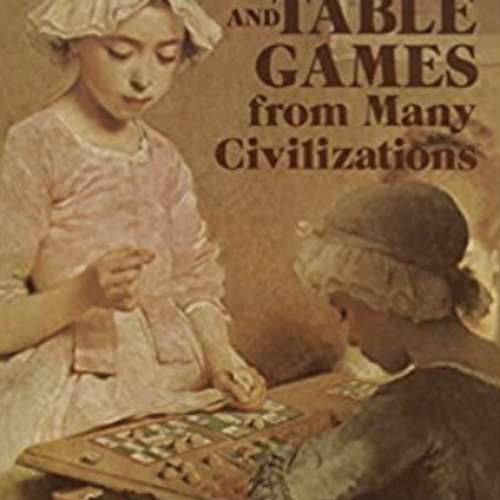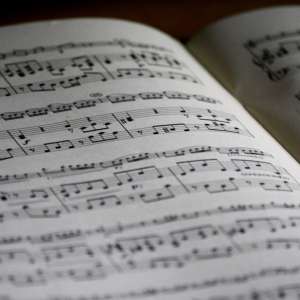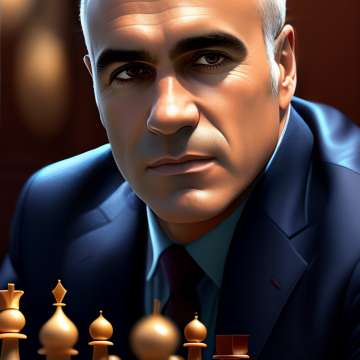

Garry Kasparov
The point of modern propaganda isn't only to misinform or push an agenda. It is to exhaust your critical thinking, to annihilate truth.
Garry Kimovich Kasparov is a Russian chess grandmaster, former World Chess Champion, writer, and political activist. From 1984 until his retirement in 2005, Kasparov was ranked world No. 1 for 255 months overall for his career. His peak rating of 2851, achieved in 1999, was the highest recorded until being surpassed by Magnus Carlsen in 2013. Kasparov also holds records for consecutive professional tournament victories 15 and Chess Oscars 11.
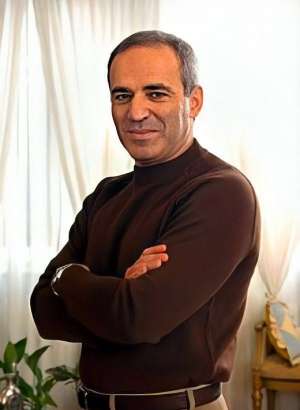
Kasparov became the youngest ever undisputed World Chess Champion in 1985 at age 22 by defeating then-champion Anatoly Karpov. He held the official FIDE world title until 1993, when a dispute with FIDE led him to set up a rival organization, the Professional Chess Association. In 1997 he became the first world champion to lose a match to a computer under standard time controls, when he lost to the IBM supercomputer Deep Blue in a highly publicized match. He continued to hold the "Classical" World Chess Championship until his defeat by Vladimir Kramnik in 2000. In spite of losing the title, he continued winning tournaments and was the world's highest-rated player when he retired from professional chess in 2005.
After Kasparov retired, he devoted his time to politics and writing. He formed the United Civil Front movement, and joined as a member of The Other Russia, a coalition opposing the administration and policies of Vladimir Putin. In 2008, he announced an intention to run as a candidate in that year's Russian presidential race, but failure to find a sufficiently large rental space to assemble the number of supporters that is legally required to endorse such a candidacy led him to withdraw. Kasparov blamed "official obstruction" for the lack of available space. He is widely regarded in the West as a symbol of opposition to Putin, and he was barred from the presidential ballot as the political climate in Russia makes it difficult for opposition candidates to organize.
Kasparov is currently chairman for the Human Rights Foundation and chairs its International Council. In 2017, he founded the Renew Democracy Initiative RDI, an American political organization promoting and defending liberal democracy in the U.S. and abroad. He also serves as chairman of the group. Kasparov currently lives in New York City.
Early career
Kasparov was born Garik Kimovich Weinstein Russian: Гарик Вайнштейн in Baku, Azerbaijan SSR now Azerbaijan, Soviet Union. His father, Kim Moiseyevich Weinstein, was Jewish, and his mother, Klara Shagenovna Kasparova, was Armenian. Kasparov has described himself as a "self-appointed Christian", although "very indifferent" and identifies as Russian: "although I'm half-Armenian, half-Jewish, I consider myself Russian because Russian is my native tongue, and I grew up with Russian culture."
Kasparov began the serious study of chess after he came across a chess problem set up by his parents and proposed a solution. When Garry was seven years old, his father died of leukemia. At the age of twelve, Garry, upon request of his mother Klara and with the consent of the family, adopted Klara's surname Kasparov, which was done to avoid possible antisemitic tensions, which were common in the USSR at the time.
From age 7, Kasparov attended the Young Pioneer Palace in Baku and, at 10 began training at Mikhail Botvinnik's chess school under noted coach Vladimir Makogonov. Makogonov helped develop Kasparov's positional skills and taught him to play the Caro-Kann Defence and the Tartakower System of the Queen's Gambit Declined. Kasparov won the Soviet Junior Championship in Tbilisi in 1976, scoring 7 points of 9, at age 13. He repeated the feat the following year, winning with a score of 8.5 of 9. He was being trained by Alexander Shakarov during this time.
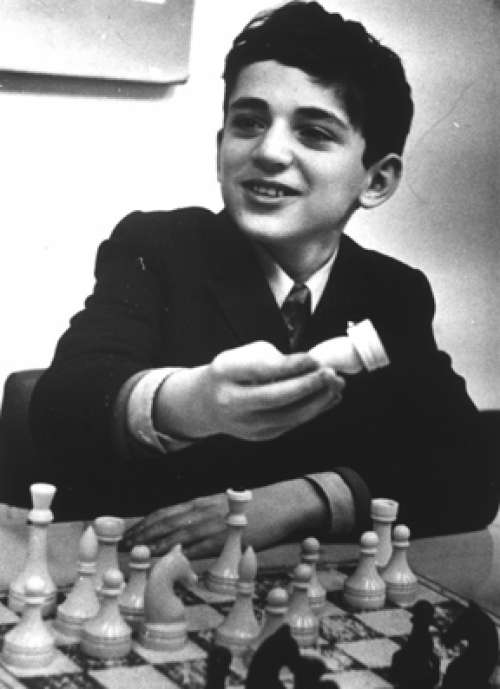
In 1978, Kasparov participated in the Sokolsky Memorial tournament in Minsk. He had been invited as an exception but took first place and became a chess master. Kasparov has repeatedly said that this event was a turning point in his life, and that it convinced him to choose chess as his career. "I will remember the Sokolsky Memorial as long as I live", he wrote. He has also said that after the victory, he thought he had a very good shot at the World Championship.
He first qualified for the Soviet Chess Championship at age 15 in 1978, the youngest ever player at that level. He won the 64-player Swiss system tournament at Daugavpils on tiebreak over Igor V. Ivanov to capture the sole qualifying place.
Kasparov rose quickly through the FIDE world rankings. Starting with an oversight by the Russian Chess Federation, he participated in a grandmaster tournament in Banja Luka, Bosnia and Herzegovina then part of Yugoslavia, in 1979 while still unrated he was a replacement for the Soviet defector Viktor Korchnoi, who was originally invited but withdrew due to the threat of a boycott from the Soviets. Kasparov won this high-class tournament, emerging with a provisional rating of 2595, enough to catapult him to the top group of chess players at the time, number 15 in the world. The next year, 1980, he won the World Junior Chess Championship in Dortmund, West Germany. Later that year, he made his debut as second reserve for the Soviet Union at the Chess Olympiad at Valletta, Malta, and became a Grandmaster.
Towards the top
As a teenager, Kasparov tied for first place in the USSR Chess Championship in 1981–82. His first win in a superclass-level international tournament was scored at Bugojno, Yugoslavia in 1982. He earned a place in the 1982 Moscow Interzonal tournament, which he won, to qualify for the Candidates Tournament. At age 19, he was the youngest Candidate since Bobby Fischer, who was 15 when he qualified in 1958. At this stage, he was already the No. 2-rated player in the world, trailing only World Chess Champion Anatoly Karpov on the January 1983 list.
Kasparov's first quarter-final Candidates match was against Alexander Beliavsky, whom he defeated 6–3 four wins, one loss. Politics threatened Kasparov's semi-final against Viktor Korchnoi, which was scheduled to be played in Pasadena, California. Korchnoi had defected from the Soviet Union in 1976, and was at that time the strongest active non-Soviet player. Various political maneuvers prevented Kasparov from playing Korchnoi, and Kasparov forfeited the match. This was resolved by Korchnoi allowing the match to be replayed in London, along with the previously scheduled match between Vasily Smyslov and Zoltán Ribli. The Kasparov-Korchnoi match was put together on short notice by Raymond Keene. Kasparov lost the first game but won the match 7–4 four wins, one loss.

In January 1984, Kasparov became the No. 1 ranked player in the world, with a FIDE rating of 2710. He became the youngest ever world No. 1, a record that lasted 12 years until being broken by Vladimir Kramnik in January 1996; the record is currently held by Magnus Carlsen.
Later in 1984, he won the Candidates' final 8½–4½ four wins, no losses against the resurgent former world champion Vasily Smyslov, at Vilnius, thus qualifying to play Anatoly Karpov for the World Championship. That year he joined the Communist Party of the Soviet Union CPSU, as a member of which he was elected to the Central Committee of Komsomol in 1987.
1984 World Championship
The World Chess Championship 1984 match between Anatoly Karpov and Garry Kasparov had many ups and downs, and a very controversial finish. Karpov started in very good form, and after nine games Kasparov was down 4–0 in a "first to six wins" match. Fellow players predicted he would be whitewashed 6–0 within 18 games.
In an unexpected turn of events, there followed a series of 17 successive draws, some relatively short, and others drawn in unsettled positions. Kasparov lost game 27 5–0, then fought back with another series of draws until game 32 5–1, earning his first-ever win against the World Champion. Another 14 successive draws followed, through game 46; the previous record length for a world title match had been 34 games, the match of José Raúl Capablanca vs. Alexander Alekhine in 1927.
Kasparov won games 47 and 48 to bring the scores to 5–3 in Karpov's favour. Then the match was ended without result by Florencio Campomanes, the President of the Fédération Internationale des Échecs FIDE, and a new match was announced to start a few months later. The termination was controversial, as both players stated that they preferred the match to continue. Announcing his decision at a press conference, Campomanes cited the health of the players, which had been strained by the length of the match.
The match became the first, and so far only, world championship match to be abandoned without result. Kasparov's relations with Campomanes and FIDE were greatly strained, and the feud between them finally came to a head in 1993 with Kasparov's complete break-away from FIDE.
World Champion
The second Karpov-Kasparov match in 1985 was organized in Moscow as the best of 24 games where the first player to win 12½ points would claim the World Champion title. The scores from the terminated match would not carry over; however, in the event of a 12–12 draw, the title would remain with Karpov. On 9 November 1985, Kasparov secured the title by a score of 13–11, winning the 24th game with Black, using a Sicilian defense. He was 22 years old at the time, making him the youngest ever World Champion, and breaking the record held by Mikhail Tal for over 20 years. Kasparov's win as Black in the 16th game has been recognized as one of the all-time masterpieces in chess history.
As part of the arrangements following the aborted 1984 match, Karpov had been granted in the event of his defeat a right to rematch. Another match took place in 1986, hosted jointly in London and Leningrad, with each city hosting 12 games. At one point in the match, Kasparov opened a three-point lead and looked well on his way to a decisive match victory. But Karpov fought back by winning three consecutive games to level the score late in the match. At this point, Kasparov dismissed one of his seconds, grandmaster Evgeny Vladimirov, accusing him of selling his opening preparation to the Karpov team as described in Kasparov's autobiography Unlimited Challenge, chapter Stab in the Back. Kasparov scored one more win and kept his title by a final score of 12½–11½.

A fourth match for the world title took place in 1987 in Seville, as Karpov had qualified through the Candidates' Matches to again become the official challenger. This match was very close, with neither player holding more than a one-point lead at any time during the contest. Kasparov was down one full point at the time of the final game, and needed a win to draw the match and retain his title. A long tense game ensued in which Karpov blundered away a pawn just before the first time control, and Kasparov eventually won a long ending. Kasparov retained his title as the match was drawn by a score of 12–12. All this meant that Kasparov had played Karpov four times in the period 1984–87, a statistic unprecedented in chess. Matches organized by FIDE had taken place every three years since 1948, and only Botvinnik had a right to a rematch before Karpov.
A fifth match between Kasparov and Karpov was held in New York and Lyon in 1990, with each city hosting 12 games. Again, the result was a close one with Kasparov winning by a margin of 12½–11½. In their five world championship matches, Kasparov had 21 wins, 19 losses, and 104 draws in 144 games.
Break with and ejection from FIDE
With the World Champion title in hand, Kasparov began opposing FIDE. In November 1986, he created the Grandmasters Association GMA, an organization to represent professional chess players and give them more say in FIDE's activities. Kasparov assumed a leadership role. GMA's major achievement was in organizing a series of six World Cup tournaments for the world's top players. A somewhat uneasy relationship developed with FIDE, and a sort of truce was brokered by Bessel Kok, a Dutch businessman.
This stand-off lasted until 1993, by which time a new challenger had qualified through the Candidates cycle for Kasparov's next World Championship defense: Nigel Short, a British grandmaster who had defeated Anatoly Karpov in a qualifying match, and then Jan Timman in the finals held in early 1993. After a confusing and compressed bidding process produced lower financial estimates than expected, the world champion and his challenger decided to play outside FIDE's jurisdiction, under another organization created by Kasparov called the Professional Chess Association PCA. At this point, a great fracture occurred in the lineage of the FIDE World Championship. In an interview in 2007, Kasparov called the break with FIDE the worst mistake of his career, as it hurt the game in the long run.
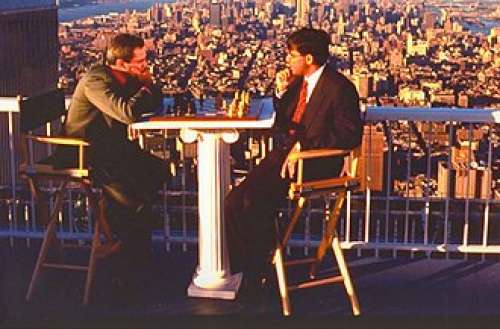
Kasparov and Short were ejected from FIDE, and played their well-sponsored match in London in 1993. Kasparov won convincingly by a score of 12½–7½. The match considerably raised the profile of chess in the UK, with an unprecedented level of coverage on Channel 4. Meanwhile, FIDE organized a World Championship match between Jan Timman the defeated Candidates finalist and former World Champion Karpov a defeated Candidates semi-finalist, which Karpov won.
FIDE removed Kasparov and Short from the FIDE rating lists. Until this happened, there was a parallel rating list presented by PCA which featured all world top players, regardless of their relation to FIDE. There were now two World Champions: PCA champion Kasparov, and FIDE champion Karpov. The title remained split for 13 years.
Kasparov defended his title in a 1995 match against Viswanathan Anand at the World Trade Center in New York City. Kasparov won the match by four wins to one, with thirteen draws. It was the last World Championship to be held under the auspices of the PCA, which collapsed when Intel, one of its major backers, withdrew its sponsorship.

Kasparov tried to organize another World Championship match, under another organization, the World Chess Association WCA with Linares organizer Luis Rentero. Alexei Shirov and Vladimir Kramnik played a candidates match to decide the challenger, which Shirov won in a surprising upset. But when Rentero admitted that the funds required and promised had never materialized, the WCA collapsed. This left Kasparov stranded, and yet another organization stepped in: BrainGames.com, headed by Raymond Keene. No match against Shirov was arranged, and talks with Anand collapsed, so a match was instead arranged against Kramnik.
During this period, Kasparov was approached by Oakham School in the United Kingdom, at the time the only school in the country with a full-time chess coach, and developed an interest in the use of chess in education. In 1997, Kasparov supported a scholarship programme at the school. Kasparov also won the Marca Leyenda trophy that year.
Losing the title and aftermath
The Kasparov-Kramnik match took place in London during the latter half of 2000. Kramnik had been a student of Kasparov's at the famous Botvinnik/Kasparov chess school in Russia, and had served on Kasparov's team for the 1995 match against Viswanathan Anand.
The better-prepared Kramnik won game 2 against Kasparov's Grünfeld Defence and achieved winning positions in Games 4 and 6, although Kasparov held the draw in both games. Kasparov made a critical error in Game 10 with the Nimzo-Indian Defence, which Kramnik exploited to win in 25 moves. As White, Kasparov could not crack the passive but solid Berlin Defence in the Ruy Lopez, and Kramnik successfully drew all his games as Black. Kramnik won the match 8½–6½. Kasparov became the first player to lose a world championship match without winning a game since Emanuel Lasker's loss to José Raúl Capablanca in 1921.
After losing the title, Kasparov won a series of major tournaments, and remained the top rated player in the world, ahead of both Kramnik and the FIDE World Champions. In 2001 he refused an invitation to the 2002 Dortmund Candidates Tournament for the Classical title, claiming his results had earned him a rematch with Kramnik.

Kasparov and Karpov played a four-game match with rapid time controls over two days in December 2002 in New York City. Karpov surprised the experts and emerged victorious, winning two games and drawing one.
Due to Kasparov's continuing strong results, and status as world No. 1 in much of the public eye, he was included in the so-called "Prague Agreement", masterminded by Yasser Seirawan and intended to reunite the two World Championships. Kasparov was to play a match against the FIDE World Champion Ruslan Ponomariov in September 2003. But this match was called off after Ponomariov refused to sign his contract for it without reservation. In its place, there were plans for a match against Rustam Kasimdzhanov, winner of the FIDE World Chess Championship 2004, to be held in January 2005 in the United Arab Emirates. These also fell through due to lack of funding. Plans to hold the match in Turkey instead came too late. Kasparov announced in January 2005 that he was tired of waiting for FIDE to organize a match and so had decided to stop all efforts to regain the World Championship title.
Retirement from chess
After winning the prestigious Linares tournament for the ninth time, Kasparov announced on 10 March 2005 that he would retire from serious competitive chess. He cited as the reason a lack of personal goals in the chess world he commented when winning the Russian championship in 2004 that it had been the last major title he had never won outright and expressed frustration at the failure to reunify the world championship.

Kasparov said he may play in some rapid chess events for fun, but intends to spend more time on his books, including both the My Great Predecessors series see below and a work on the links between decision-making in chess and in other areas of life, and will continue to involve himself in Russian politics, which he views as "headed down the wrong path".
Kasparov has been married three times: to Masha, with whom he had a daughter before divorcing; to Yulia, with whom he had a son before their 2005 divorce; and to Daria Dasha, with whom he has two children, a daughter born in 2006 and a son born in 2015. They live in New York City. Kasparov's wife manages his business activities worldwide as the founder of Kasparov International Management Inc.
Post-retirement chess
On 22 August 2006, in his first public chess games since his retirement, Kasparov played in the Lichthof Chess Champions Tournament, a blitz event played at the time control of 5 minutes per side and 3-second increments per move. Kasparov tied for first with Anatoly Karpov, scoring 4½/6.
Kasparov and Anatoly Karpov played a 12-game match from 21–24 September 2009, in Valencia, Spain. It consisted of four rapid or semi rapid games, in which Kasparov won 3–1, and eight blitz games, in which Kasparov won 6–2, winning the match with total result 9–3. The event took place exactly 25 years after the two players' legendary encounter at World Chess Championship 1984.
Kasparov actively coached Magnus Carlsen for approximately one year beginning in February 2009. The collaboration remained secret until September 2009. Under Kasparov's tutelage, Carlsen in October 2009 became the youngest ever to achieve a FIDE rating higher than 2,800, and rose from world number four to world number one. While the pair initially planned to work together throughout 2010, in March of that year it was announced that Carlsen had split from Kasparov and would no longer be using him as a trainer. According to an interview with the German magazine Der Spiegel, Carlsen indicated that he would remain in contact and that he would continue to attend training sessions with Kasparov, but in fact no further training sessions were held and the cooperation gradually fizzled out over the course of the spring.

In May 2010 he played 30 games simultaneously, winning each one, against players at Tel Aviv University in Israel. In the same month it was revealed that Kasparov had aided Viswanathan Anand in preparation for the World Chess Championship 2010 against challenger Veselin Topalov. Anand won the match 6½–5½ to retain the title.
In January 2011, Kasparov began training the U.S. grandmaster Hikaru Nakamura. The first of several training sessions was held in New York just prior to Nakamura's participation in the Tata Steel Chess tournament in Wijk aan Zee, the Netherlands. In December 2011, it was announced that the cooperation had come to an end.
Kasparov played two blitz exhibition matches in the autumn of 2011. The first was in September against French grandmaster Maxime Vachier-Lagrave, in Clichy France, which Kasparov won 1½–½. The second was a longer match consisting of eight blitz games played on 9 October, against English grandmaster Nigel Short. Kasparov won again by a score of 4½–3½.
A little after that, in October 2011, Kasparov played and defeated fourteen opponents in a simultaneous exhibition that took place in Bratislava.
On 25 and 26 April 2015, Kasparov played a mini-match against Nigel Short. The match consisted of two rapid games and eight blitz games, and was contested over the course of two days. Both commentators GM Maurice Ashley and Alejandro Ramirez remarked how Kasparov was an 'initiative hog' throughout the match, consistently not allowing Short to gain any foothold in the games, and won the match decisively with a score of 8½–1½. Kasparov also managed to win all five games on the second day, with his victories characterised by aggressive pawn moves breaking up Short's position, thereby allowing Kasparov's pieces to achieve positional superiority.
On Wednesday 19 August 2015 he played and won all 19 games of a simultaneous exhibition in Pula, Croatia.
On Thursday 28 April and Friday 29 April 2016 at the Chess Club and Scholastic Center of Saint Louis, Kasparov played a 6-round exhibition blitz round-robin tournament with Fabiano Caruana, Wesley So, and Hikaru Nakamura in an event called the Ultimate Blitz Challenge. He finished the tournament third with 9.5/18, behind Hikaru Nakamura 11/18 and Wesley So 10/18. At the post-tournament interview, he considered the possibility of playing future top-level blitz exhibition matches.
On 2 June 2016, Kasparov played against fifteen chess players in a simultaneous exhibition in the Kaiser-Friedrich-Halle of Mönchengladbach. He won all games.
Candidate for FIDE presidency
On 7 October 2013, Kasparov announced his candidacy for World Chess Federation president during a reception in Tallinn, Estonia, where the 84th FIDE Congress took place. Kasparov's candidacy was supported by his former student, reigning World Chess Champion and FIDE#1 ranked player Magnus Carlsen. At the FIDE General Assembly in August 2014, Kasparov lost the presidential election to incumbent FIDE president Kirsan Ilyumzhinov, with a vote of 110–61.
A few days before the election took place, the New York Times Magazine had published a lengthy report on the viciously fought campaign. Included was information about a leaked contract between Kasparov and former FIDE Secretary General Ignatius Leong from Singapore, in which the Kasparov campaign reportedly "offered to pay Leong $500,000 and to pay $250,000 a year for four years to the Asean Chess Academy, an organization Leong helped create to teach the game, specifying that Leong would be responsible for delivering 11 votes from his region ". In September 2015, the FIDE Ethics Commission found Kasparov and Leong guilty of violating its Code of Ethics and later suspended them for two years from all FIDE functions and meetings.
Return from retirement
In 2017, Kasparov came out of retirement to participate in the inaugural St. Louis Rapid and Blitz tournament from 14–19 August, scoring 3.5/9 in the rapid and 9/18 in the blitz, finishing 8th out of 10 participants, which included Nakamura, Caruana, former world champion Anand, and the eventual winner, Aronian. Any tournament money that he earned would go towards charities to promote chess in Africa.
Politics
1980s
Kasparov's grandfather was a staunch communist but Kasparov gradually began to have doubts about the Soviet Union's political system at age 13 when he traveled abroad for the first time to Paris for a chess tournament. In 1981, at age 18 he read Solzhenitsyn's The Gulag Archipelago, a copy of which he bought while abroad.
Kasparov joined the Communist Party of the Soviet Union CPSU in 1984, and in 1987 was elected to the Central Committee of Komsomol. However, in 1990, he left the party.
1990s
In May 1990, Kasparov took part in the creation of the Democratic Party of Russia, which at first was a liberal anti-communist party, later shifting to centrism. Kasparov left the party on 28 April 1991, after its conference.
In 1991, Kasparov received the Keeper of the Flame award from the Center for Security Policy, a far-right, anti-muslim Washington, D.C. based think tank for "propagation of democracy and the respect for individual rights throughout the world". In his acceptance speech Kasparov lauded the defeat of communism while also urging the United States to give no financial assistance to central Soviet leaders.
In June 1993, Kasparov was involved with the creation of the "Choice of Russia" bloc of parties and in 1996 took part in the election campaign of Boris Yeltsin. In 2001 he voiced his support for the Russian television channel NTV.
In 1997, Kasparov was awarded honorary citizenship of Bosnia and Herzegovina for his support of Bosnian people during the war in the former Yugoslavia.
2000s
After his retirement from chess in 2005, Kasparov turned to politics and created the United Civil Front, a social movement whose main goal is to "work to preserve electoral democracy in Russia". He has vowed to "restore democracy" to Russia by restoring the rule of law.
Kasparov was instrumental in setting up The Other Russia, a coalition which opposes Putin's government. The Other Russia has been boycotted by the leaders of Russia's mainstream opposition parties, Yabloko and Union of Right Forces due to its inclusion of both nationalist and radical groups. Kasparov has criticized these groups as being secretly under the auspices of the Kremlin.
In April 2005, Kasparov was in Moscow at a promotional event when he was struck over the head with a chessboard he had just signed. The assailant was reported to have said "I admired you as a chess player, but you gave that up for politics" immediately before the attack. Kasparov has been the subject of a number of other episodes since, including police brutality and alleged harassment from the Russian secret service.

Kasparov helped organize the Saint Petersburg Dissenters' March on 3 March 2007 and The March of the Dissenters on 24 March 2007, both involving several thousand people rallying against Putin and Saint Petersburg Governor Valentina Matviyenko's policies.
In April 2007, Kasparov led a pro-democracy demonstration in Moscow. Soon after the demonstration's start, however, over 9,000 police descended on the group and seized almost everyone. Kasparov, who was briefly arrested by the Moscow police, was warned by the prosecution office on the eve of the march that anyone participating risked being detained. He was held for some 10 hours and then fined and released. He was later summoned by the FSB for violations of Russian anti-extremism laws.
Speaking about Kasparov, former KGB defector Oleg Kalugin in 2007 remarked, "I do not talk in details – people who knew them are all dead now because they were vocal, they were open. I am quiet. There is only one man who is vocal and he may be in trouble: Kasparov. He has been very outspoken in his attacks on Putin and I believe that he is probably next on the list."
Kasparov gave speeches at think tanks such as the Hoover Institution.
On 30 September 2007, Kasparov entered the Russian presidential race, receiving 379 of 498 votes at a congress held in Moscow by The Other Russia. In October 2007, Kasparov announced his intention of standing for the Russian presidency as the candidate of the "Other Russia" coalition and vowed to fight for a "democratic and just Russia". Later that month he traveled to the United States, where he appeared on several popular television programs, which were hosted by Stephen Colbert, Wolf Blitzer, Bill Maher, and Chris Matthews.
In November 2007, Kasparov and other protesters were detained by police at an Other Russia rally in Moscow, which drew 3,000 demonstrators to protest election rigging. Following an attempt by about 100 protesters to march through police lines to the electoral commission, which had barred Other Russia candidates from parliamentary elections, arrests were made. The Russian authorities stated a rally had been approved but not any marches, resulting in several detained demonstrators. He was subsequently charged with resisting arrest and organizing an unauthorized protest and given a jail sentence of five days. Kasparov appealed the charges, citing that he had been following orders given by the police, although it was denied. He was released from jail on 29 November. Putin criticized Kasparov at the rally for his use of English when speaking rather than Russian.
In December 2007, Kasparov announced that he had to withdraw his presidential candidacy due to inability to rent a meeting hall where at least 500 of his supporters could assemble. With the deadline expiring on that date, he explained it was impossible for him to run. Russian election laws required sufficient meeting hall space for assembling supporters. Kasparov's spokeswoman accused the government of using pressure to deter anyone from renting a hall for the gathering and said that the electoral commission had rejected a proposal that would have allowed for smaller gathering sizes rather than one large gathering at a meeting hall.
2010s
Kasparov was among the 34 first signatories and a key organizer of the online anti-Putin campaign "Putin must go", started on 10 March 2010. The campaign was begun by a coalition of opposition to Putin who regard his rule as lacking any rule of law. Within the text is a call to Russian law enforcement to ignore Putin's orders. By June 2011, there were 90,000 signatures. While the identity of the petition author remained anonymous, there was wide speculation that it was indeed Kasparov.
On 17 August 2012, Kasparov was arrested and beaten outside of the Moscow court while attending the verdict reading in the case involving the all-female punk band Pussy Riot. On 24 August, he was cleared of charges that he took part in an unauthorized protest against the conviction of three members of Pussy Riot. Judge Yekaterina Veklich said there were "no grounds to believe the testimony of the police". He could still face criminal charges over a police officer's claims that the opposition leader bit his finger while he was being detained. He later thanked all the bloggers and reporters who provided video evidence that contradicted the testimony of the police.
Kasparov wrote in February 2013 that "fascism has come to Russia. ... Project Putin, just like the old Project Hitler, is but the fruit of a conspiracy by the ruling elite. Fascist rule was never the result of the free will of the people. It was always the fruit of a conspiracy by the ruling elites!"
In April 2013, Kasparov joined in an HRF condemnation of Kanye West for having performed for the leader of Kazakhstan in exchange for a $3 million paycheck, saying that West "has entertained a brutal killer and his entourage" and that his fee "came from the loot stolen from the Kazakhstan treasury".
Kasparov denied rumors in April 2013 that he planned to leave Russia for good. "I found these rumors to be deeply saddening and, moreover, surprising," he wrote. "I was unable to respond immediately because I was in such a state of shock that such an incredibly inaccurate statement, the likes of which is constantly distributed by the Kremlin's propagandists, came this time from Ilya Yashin, a fellow member of the Opposition Coordination Council KSO and my former colleague from the Solidarity movement."
In an April 2013 op-ed piece, Kasparov accused prominent Russian journalist Vladimir Posner of failing to stand up to Putin and to earlier Russian and Soviet leaders.
Kasparov was presented with the Morris B. Abram Human Rights Award, UN Watch's annual human-rights prize, in 2013. The organization, a lobby group with strong ties to Israel, praised him as "not only one of the world's smartest men" but "also among its bravest".
At the 2013 Women in the World conference, Kasparov told The Daily Beast's Michael Moynihan that democracy no longer existed in what he called Russia's "dictatorship".
Kasparov said at a press conference in June 2013 that if he returned to Russia he doubted he would be allowed to leave again, given Putin's ongoing crackdown against dissenters. "So for the time being," he said, "I refrain from returning to Russia." He explained shortly thereafter in an article for The Daily Beast that this had not been intended as "a declaration of leaving my home country, permanently or otherwise", but merely an expression of "the dark reality of the situation in Russia today, where nearly half the members of the opposition's Coordinating Council are under criminal investigation on concocted charges". He noted that the Moscow prosecutor's office was "opening an investigation that would limit my ability to travel", making it impossible for him to fulfill "professional speaking engagements" and hindering his "work for the nonprofit Kasparov Chess Foundation, which has centers in New York City, Brussels, and Johannesburg to promote chess in education".
Kasparov further wrote in his June 2013 Daily Beast article that the mass protests in Moscow 18 months earlier against fraudulent Russian elections had been "a proud moment for me". He recalled that after joining the opposition movement in March 2005, he had been criticized for seeking to unite "every anti-Putin element in the country to march together regardless of ideology". Therefore, the sight of "hundreds of flags representing every group from liberals to nationalists all marching together for 'Russia Without Putin' was the fulfillment of a dream." Yet most Russians, he lamented, had continued to "slumber" even as Putin had "taken off the flimsy mask of democracy to reveal himself in full as the would-be KGB dictator he has always been".
Kasparov responded with several sardonic Twitter postings to a September 2013 The New York Times op-ed by Putin. "I hope Putin has taken adequate protections," he tweeted. "Now that he is a Russian journalist his life may be in grave danger!" Also: "Now we can expect NY Times op-eds by Mugabe on fair elections, Castro on free speech, & Kim Jong-un on prison reform. The Axis of Hypocrisy."
In a 12 May 2013 op-ed for The Wall Street Journal, Kasparov questioned reports that the Russian security agency, the FSB, had fully cooperated with the FBI in the matter of the Boston bombers. He noted that the elder bomber, Tamerlan Tsarnaev, had reportedly met in Russia with two known jihadists who "were killed in Dagestan by the Russian military just days before Tamerlan left Russia for the U.S." Kasparov argued, "If no intelligence was sent from Moscow to Washington" about this meeting, "all this talk of FSB cooperation cannot be taken seriously." He further observed, "This would not be the first time Russian security forces seemed strangely impotent in the face of an impending terror attack," pointing out that in both the 2002 Moscow theater siege and the 2004 Beslan school attack, "there were FSB informants in both terror groups – yet the attacks went ahead unimpeded." Given this history, he wrote, "it is impossible to overlook that the Boston bombing took place just days after the U.S. Magnitsky List was published, creating the first serious external threat to the Putin power structure by penalizing Russian officials complicit in human-rights crimes." In sum, Putin's "dubious record on counterterrorism and its continued support of terror sponsors Iran and Syria mean only one thing: common ground zero".
Kasparov wrote in July 2013 about the trial in Kirov of fellow opposition leader Alexei Navalny, who had been convicted "on concocted embezzlement charges", only to see the prosecutor, surprisingly, ask for his release the next day pending appeal. "The judicial process and the democratic process in Russia," wrote Kasparov, "are both elaborate mockeries created to distract the citizenry at home and to help Western leaders avoid confronting the awkward fact that Russia has returned to a police state". Still, Kasparov felt that whatever had caused the Kirov prosecutor's about-face, "my optimism tells me it was a positive sign. After more than 13 years of predictable repression under Putin, anything different is good."
Kasparov maintains a summer home in the Croatian city of Makarska. In early February 2014, Kasparov applied for citizenship by naturalisation in Croatia, adding that he was finding it increasingly difficult to live in Russia. According to an article in The Guardian, Kasparov is "widely perceived" as having been a vocal supporter of Croatian independence during the early 1990s. On 28 February 2014, his application for naturalisation was approved, and he is now a Croatian passport holder.
Views
In September 2013, Kasparov wrote in Time magazine that in Syria, Putin and Bashar al-Assad "won by forfeit when President Obama, Prime Minister Cameron and the rest of the so-called leaders of the free world walked away from the table." Kasparov lamented the "new game at the negotiating table where Putin and Assad set the rules and will run the show under the protection of the U.N." Kasparov said in September 2013 that Russia was now a dictatorship. In the same month he told an interviewer that "Obama going to Russia now is dead wrong, morally and politically," because Putin's regime "is behind Assad".
Kasparov has been outspoken against Putin's antigay laws, describing them as "only the most recent encroachment on the freedom of speech and association of Russia's citizens" which the international community had largely ignored. Regarding Russia's hosting of the 2014 Winter Olympics, Kasparov explained in August 2013 that he had opposed Russia's bid from the outset, since it would "allow Vladimir Putin's cronies to embezzle hundreds of millions of dollars" and "lend prestige to Putin's authoritarian regime". Kasparov did not support the proposed Sochi Olympics boycott—writing that it would "unfairly punish athletes"—but called for athletes and others to "transform Putin's self-congratulatory pet project into a spotlight that exposes his authoritarian rule" to the world. In September, Kasparov called upon politicians to refuse to attend the games and the public to pressure sponsors and the media, such that Coca-Cola, for example, could put "a rainbow flag on each Coca-Cola can" and NBC could "do interviews with Russian gay activists or with Russian political activists". Kasparov also emphasized that although he was "still a Russian citizen", he had "good reason to be concerned about my ability to leave Russia if I returned to Moscow".

Kasparov has spoken out against the 2014 Russian annexation of Crimea and has stated that control of Crimea should be returned to Ukraine after the overthrow of Putin without additional conditions.
Kasparov's website was blocked by the Russian government censorship agency, Roskomnadzor, at the behest of the public prosecutor, allegedly due to Kasparov's opinions of the Crimean crisis. Kasparov's block was made in unison with several other notable Russian sites that were accused of inciting public outrage. Reportedly, several of the blocked sites received an affidavit noting their violations. However, Kasparov stated that his site had received no such notice of violations after its block. In 2015 a whole note on Kasparov was removed from a Russian language encyclopedia of greatest Soviet players after an intervention from "senior leadership".
In October 2015, Kasparov published a book titled Winter Is Coming: Why Vladimir Putin and the Enemies of the Free World Must Be Stopped. In the book, Kasparov likens Putin to Hitler, and explains the need for the west to oppose Putin sooner, rather than appeasing him and postponing the eventual confrontation. According to his publisher, "Kasparov wants this book out fast, in a way that has potential to influence the discussion during the primary season."
In the 2016 United States presidential election, Kasparov described Republican Donald Trump as "a celebrity showman with racist leanings and authoritarian tendencies" and criticised Trump for calling for closer ties with Putin. After Trump's running mate, Mike Pence, called Putin a strong leader, Kasparov said that Putin is a strong leader "in the same way arsenic is a strong drink". He also criticised the economic policies of Democratic primary candidate Bernie Sanders, but showed respect for Sanders as "a charismatic speaker and a passionate believer in his cause".
In 2017, he condemned the violence unleashed by the Spanish police against the independence referendum in Catalonia. He criticized the Spanish PM Mariano Rajoy and accused him of "betraying" the European promise of peace. After the Catalan regional election held later the same year, Kasparov wrote: "Despite unprecedented pressure from Madrid, Catalonian separatists won a majority. Europe must speak and help find a peaceful path toward resolution and avoid more violence".
Kasparov supports recognition of the Armenian Genocide.
He welcomed Velvet Revolution in Armenia in 2018, just few days after it happened.
Human Rights Foundation
Kasparov was named Chairman of the Human Rights Foundation in 2011, succeeding the recently deceased author, activist, and former Czech president Václav Havel. On 31 January 2012, Kasparov hosted a meeting of opposition leaders planning a mass march on 4 February 2012, the third major opposition rally held since the disputed State Duma elections of December 2011. Among other opposition leaders attending were Alexey Navalny and Yevgenia Chirikova.
Playing style
Kasparov's attacking style of play has been compared by many to Alekhine's. Kasparov has described his style as being influenced chiefly by Alekhine, Tal and Fischer. Kramnik has opined that " capacity for study is second to none", and said "There is nothing in chess he has been unable to deal with." Magnus Carlsen, whom Kasparov coached from 2009 to 2010, said of Kasparov, "I've never seen someone with such a feel for dynamics in complex positions." Kasparov was known for his extensive opening preparation and aggressive play in the opening.
Olympiads and other major team events
Kasparov played in a total of eight Chess Olympiads. He represented the Soviet Union four times and Russia four times, following the breakup of the Soviet Union in 1991. In his 1980 Olympiad debut, he became, at age 17, the youngest player to represent the Soviet Union or Russia at that level, a record which was broken by Vladimir Kramnik in 1992. In 82 games, he has scored +50−3=29, for 78.7% and won a total of 19 medals, including team gold medals all eight times he competed. For the 1994 Moscow Olympiad, he had a significant organizational role, in helping to put together the event on short notice, after Thessaloniki canceled its offer to host, a few weeks before the scheduled dates. Kasparov's detailed Olympiad record follows:
- Valletta 1980, USSR 2nd reserve, 9½/12 +8−1=3, team gold, board bronze;
- Lucerne 1982, USSR 2nd board, 8½/11 +6−0=5, team gold, board bronze;
- Dubai 1986, USSR 1st board, 8½/11 +7−1=3, team gold, board gold, performance gold;
- Thessaloniki 1988, USSR 1st board, 8½/10 +7−0=3, team gold, board gold, performance gold;
- Manila 1992, Russia board 1, 8½/10 +7−0=3, team gold, board gold, performance silver;
- Moscow 1994, Russia board 1, 6½/10 +4−1=5, team gold;
- Yerevan 1996, Russia board 1, 7/9 +5−0=4, team gold, board gold, performance silver;
- Bled 2002, Russia board 1, 7½/9 +6−0=3, team gold, board gold.
Kasparov made his international teams debut for the USSR at age 16 in the 1980 European Team Championship and played for Russia in the 1992 edition of that championship. He won a total of five medals. His detailed Euroteams record, from, follows.
- Skara 1980, USSR 2nd reserve, 5½/6 +5−0=1, team gold, board gold;
- Debrecen 1992, Russia board 1, 6/8 +4−0=4, team gold, board gold, performance silver.
Kasparov also represented the USSR once in Youth Olympiad competition, but the detailed data at Olimpbase is incomplete; the Chessmetrics Garry Kasparov player file has his individual score from that event.
- Graz 1981, USSR board 1, 9/10 +8−0=2, team gold.
Records and achievements
Chess ratings achievements
Kasparov holds the record for the longest time as the No. 1 rated player in the world – from 1986 to 2005 Vladimir Kramnik shared the No. 1 ranking with him once, in the January 1996 FIDE rating list. He was also briefly ejected from the list following his split from FIDE in 1993, but during that time he headed the rating list of the rival PCA. At the time of his retirement, he was still ranked No. 1 in the world, with a rating of 2812. His rating has fallen inactive since the January 2006 rating list.
In January 1990, Kasparov achieved the then highest FIDE rating ever, passing 2800 and breaking Bobby Fischer's old record of 2785. By the July 1999 and January 2000 FIDE rating lists, Kasparov had reached a 2851 Elo rating, at that time the highest rating ever achieved. He held that record for the highest rating ever achieved until Magnus Carlsen attained a new record high rating of 2861 in January 2013.
Other records
Kasparov holds the record for most consecutive professional tournament victories, placing first or equal first in 15 individual tournaments from 1981 to 1990. The streak was broken by Vasily Ivanchuk at Linares 1991, where Kasparov placed 2nd, half a point behind him after losing their individual game. The details of this record winning streak follow:
- Frunze 1981, USSR Championship, 12½/17, tie for 1st;
- Bugojno 1982, 9½/13, 1st;
- Moscow 1982, Interzonal, 10/13, 1st;
- Nikšić 1983, 11/14, 1st;
- Brussels OHRA 1986, 7½/10, 1st;
- Brussels SWIFT 1987, 8½/11, tie for 1st;
- Amsterdam Optiebeurs 1988, 9/12, 1st;
- Belfort World Cup 1988, 11½/15, 1st;
- Moscow 1988, USSR Championship, 11½/17, tie for 1st;
- Reykjavík World Cup 1988, 11/17, 1st;
- Barcelona World Cup 1989, 11/16, tie for 1st;
- Skellefteå World Cup 1989, 9½/15, tie for 1st;
- Tilburg 1989, 12/14, 1st;
- Belgrade Investbank 1989, 9½/11, 1st;
- Linares 1990, 8/11, 1st.
Kasparov won the Chess Oscar a record eleven times.
Chess and computers
In 1983, Acorn Computers acted as one of the sponsors for Kasparov's Candidates semi-final match against Viktor Korchnoi. Kasparov was awarded a BBC Micro which he took back with him to Baku, making it perhaps the first western-made microcomputer to reach Baku at that time. In 1985, computer chess magazine editor Frederic Friedel invited Kasparov to his house, and the two of them discussed how a chess database program would be useful for preparation. Two years later, Friedel founded Chessbase, and gave a copy of the program to Kasparov who started using it in his preparation.
In 1985, Kasparov played against thirty-two different chess computers in Hamburg, winning all games, but with some difficulty.
On 22 October 1989, Kasparov defeated the chess computer Deep Thought in both games of a two-game match.
In December 1992, Kasparov visited Frederic Friedel in his hotel room in Cologne, and played 37 blitz games against Fritz 2 winning 24, drawing 4 and losing 9.
Kasparov cooperated in producing video material for the computer game Kasparov's Gambit released by Electronic Arts in November 1993. In April 1994, Intel acted as a sponsor for the first Professional Chess Association Grand Prix event in Moscow played a time control of 25 minutes per game. In May, Chessbase's Fritz 3 running on an Intel Pentium PC defeated Kasparov in their first in the Intel Express blitz tournament in Munich, but Kasparov managed to tie it for first, and then win the playoff with 3 wins and 2 draws. The next day, Kasparov lost to Fritz 3 again in a game on ZDF TV. In August, Kasparov was knocked out of the London Intel Grand Prix by Richard Lang's ChessGenius 2 program in the first round.
In 1995, during Kasparov's world title match with Viswanathan Anand, he unveiled an opening novelty that had been checked with a chess engine, an approach that would become increasingly common in subsequent years.
Kasparov played in a pair of six-game chess matches with an IBM supercomputer called Deep Blue. The first match was played in Philadelphia in 1996 and won by Kasparov. The second was played in New York City in 1997 and won by Deep Blue. The 1997 match was the first defeat of a reigning world chess champion by a computer under tournament conditions.
In May 1997, an updated version of Deep Blue defeated Kasparov 3½–2½ in a highly publicized six-game match. The match was even after five games but Kasparov lost quickly in Game 6. This was the first time a computer had ever defeated a world champion in a match. A documentary film was made about this famous match entitled Game Over: Kasparov and the Machine.
Kasparov said that he was "not well prepared" to face Deep Blue in 1997. He said that based on his "objective strengths" his play was stronger than that of Deep Blue. Kasparov claimed that several factors weighed against him in this match. In particular, he was denied access to Deep Blue's recent games, in contrast to the computer's team, which could study hundreds of Kasparov's.
After the loss, Kasparov said that he sometimes saw deep intelligence and creativity in the machine's moves, suggesting that during the second game, human chess players, in contravention of the rules, intervened. IBM denied that it cheated, saying the only human intervention occurred between games. The rules provided for the developers to modify the program between games, an opportunity they said they used to shore up weaknesses in the computer's play revealed during the course of the match. Kasparov requested printouts of the machine's log files but IBM refused, although the company later published the logs on the Internet. Much later, it was suggested that the behavior Kasparov noted may have resulted from a glitch in the computer program. Although Kasparov wanted another rematch, IBM declined and ended their Deep Blue program.
Kasparov's loss to Deep Blue inspired the creation of the game Arimaa.
In January 2003, he engaged in a six-game classical time control match with a $1 million prize fund which was billed as the FIDE "Man vs. Machine" World Championship, against Deep Junior. The engine evaluated three million positions per second. After one win each and three draws, it was all up to the final game. After reaching a decent position Kasparov offered a draw, which was soon accepted by the Deep Junior team. Asked why he offered the draw, Kasparov said he feared making a blunder. Originally planned as an annual event, the match was not repeated.
Deep Junior was the first machine to beat Kasparov with black and at a standard time control.
In June 2003, Mindscape released the computer game Kasparov Chessmate with Kasparov himself listed as a co-designer.
In November 2003, he engaged in a four-game match against the computer program X3D Fritz, using a virtual board, 3D glasses and a speech recognition system. After two draws and one win apiece, the X3D Man–Machine match ended in a draw. Kasparov received $175,000 for the result and took home the golden trophy. Kasparov continued to criticize the blunder in the second game that cost him a crucial point. He felt that he had outplayed the machine overall and played well. "I only made one mistake but unfortunately that one mistake lost the game."
Books and other writings
Early writings
Kasparov has written books on chess. He published a controversial autobiography when still in his early 20s, originally titled Child of Change, later retitled Unlimited Challenge. This book was subsequently updated several times after he became World Champion. Its content is mainly literary, with a small chess component of key unannotated games. He published an annotated games collection in 1985: Fighting Chess: My Games and Career and this book has also been updated several times in further editions. He also wrote a book annotating the games from his World Chess Championship 1985 victory, World Chess Championship Match: Moscow, 1985.
He has annotated his own games extensively for the Yugoslav Chess Informant series and for other chess publications. In 1982, he co-authored Batsford Chess Openings with British grandmaster Raymond Keene and this book was an enormous seller. It was updated into a second edition in 1989. He also co-authored two opening books with his trainer Alexander Nikitin in the 1980s for British publisher Batsford – on the Classical Variation of the Caro-Kann Defence and on the Scheveningen Variation of the Sicilian Defence. Kasparov has also contributed extensively to the five-volume openings series Encyclopedia of Chess Openings.
In 2000, Kasparov co-authored Kasparov Against the World: The Story of the Greatest Online Challenge with grandmaster Daniel King. The 202-page book analyzes the 1999 Kasparov versus the World game, and holds the record for the longest analysis devoted to a single chess game.
My Great Predecessors series
In 2003, the first volume of his five-volume work Garry Kasparov on My Great Predecessors was published. This volume, which deals with the world chess champions Wilhelm Steinitz, Emanuel Lasker, José Raúl Capablanca, Alexander Alekhine, and some of their strong contemporaries, has received lavish praise from some reviewers including Nigel Short, while attracting criticism from others for historical inaccuracies and analysis of games directly copied from unattributed sources. Through suggestions on the book's website, most of these shortcomings were corrected in following editions and translations. Despite this, the first volume won the British Chess Federation's Book of the Year award in 2003. Volume two, covering Max Euwe, Mikhail Botvinnik, Vasily Smyslov and Mikhail Tal appeared later in 2003. Volume three, covering Tigran Petrosian and Boris Spassky appeared in early 2004. In December 2004, Kasparov released volume four, which covers Samuel Reshevsky, Miguel Najdorf, and Bent Larsen none of these three were World Champions, but focuses primarily on Bobby Fischer. The fifth volume, devoted to the chess careers of World Champion Anatoly Karpov and challenger Viktor Korchnoi, was published in March 2006.
Modern Chess series
His book Revolution in the 70s published in March 2007 covers "the openings revolution of the 1970s–1980s" and is the first book in a new series called "Modern Chess Series", which intends to cover his matches with Karpov and selected games. The book "Revolution in the 70s" concerns the revolution in opening theory that was witnessed in that decade. Such systems as the controversial at the time "Hedgehog" opening plan of passively developing the pieces no further than the first three ranks are examined in great detail. Kasparov also analyzes some of the most notable games played in that period. In a section at the end of the book, top opening theoreticians provide their own "take" on the progress made in opening theory in the 1980s.
Garry Kasparov on Garry Kasparov series
Kasparov is publishing three volumes of his games.
Winter Is Coming
In October 2015, Kasparov published a book titled Winter Is Coming: Why Vladimir Putin and the Enemies of the Free World Must Be Stopped. The title is a reference to the HBO television series Game of Thrones. In the book, Kasparov writes about the need for an organization solely composed of democratic countries to replace the United Nations. In an interview, he called the United Nations a "catwalk for dictators".
Historical revision
Kasparov believes that the conventional history of civilization is radically incorrect. Specifically, he believes that the history of ancient civilizations is based on misdatings of events and achievements that actually occurred in the medieval period. He has cited several aspects of ancient history that he says are likely to be anachronisms.
Kasparov has written in support of New Chronology Fomenko, although with some reservations. In 2001, Kasparov expressed a desire to devote his time to promoting the New Chronology after his chess career. "New Chronology is a great area for investing my intellect ... My analytical abilities are well placed to figure out what was right and what was wrong." "When I stop playing chess, it may well be that I concentrate on promoting these ideas... I believe they can improve our lives."
Later, Kasparov renounced his support of Fomenko theories but reaffirmed his belief that mainstream historical knowledge is highly inconsistent.
Other post-retirement writing
In 2007, he wrote How Life Imitates Chess, an examination of the parallels between decision-making in chess and in the business world.
In 2008, Kasparov published a sympathetic obituary for Bobby Fischer, writing: "I am often asked if I ever met or played Bobby Fischer. The answer is no, I never had that opportunity. But even though he saw me as a member of the evil chess establishment that he felt had robbed and cheated him, I am sorry I never had a chance to thank him personally for what he did for our sport."
He is the chief advisor for the book publisher Everyman Chess.
Kasparov works closely with Mig Greengard and his comments can often be found on Greengard's blog apparently no longer active.
Kasparov collaborated with Max Levchin and Peter Thiel on The Blueprint, a book calling for a revival of world innovation, planned to release in March 2013 from W. W. Norton & Company. The book was never released, as the authors disagreed on its contents.
Kasparov argued that chess has become the Drosophila fruit fly of reasoning, in an editorial comment on Google's AlphaZero chess-playing system. "I was pleased to see that AlphaZero had a dynamic, open style like my own," he wrote in late 2018.
Kasparov served as a consultant for the 2020 Netflix miniseries The Queen's Gambit. He gave an extended interview to Slate describing his contributions.
Bibliography
- Kasparov Teaches Chess 1984–85, Sport in the USSR Magazine; 1986, First Collier Books
- The Test of Time Russian Chess 1986, Pergamon Pr
- World Chess Championship Match: Moscow, 1985 1986, Everyman Chess
- Child of Change: An Autobiography 1987, Hutchinson
- London–Leningrad Championship Games 1987, Everyman Chess
- Unlimited Challenge 1990, Grove Pr
- The Sicilian Scheveningen 1991, B.T. Batsford Ltd
- The Queen's Indian Defence: Kasparov System 1991, B.T. Batsford Ltd
- Kasparov Versus Karpov, 1990 1991, Everyman Chess
- Kasparov on the King's Indian 1993, B.T. Batsford Ltd
- Kasparov, Garry. Jon Speelman and Bob Wade. 1995. Garry Kasparov's Fighting Chess. Henry Holt. .mw-parser-output cite.citation{font-style:inherit}.mw-parser-output .citation q{quotes:"\"""\"""'""'"}.mw-parser-output .id-lock-free a,.mw-parser-output .citation .cs1-lock-free a{background:linear-gradienttransparent,transparent,url"//upload.wikimedia.org/wikipedia/commons/6/65/Lock-green.svg"right 0.1em center/9px no-repeat}.mw-parser-output .id-lock-limited a,.mw-parser-output .id-lock-registration a,.mw-parser-output .citation .cs1-lock-limited a,.mw-parser-output .citation .cs1-lock-registration a{background:linear-gradienttransparent,transparent,url"//upload.wikimedia.org/wikipedia/commons/d/d6/Lock-gray-alt-2.svg"right 0.1em center/9px no-repeat}.mw-parser-output .id-lock-subscription a,.mw-parser-output .citation .cs1-lock-subscription a{background:linear-gradienttransparent,transparent,url"//upload.wikimedia.org/wikipedia/commons/a/aa/Lock-red-alt-2.svg"right 0.1em center/9px no-repeat}.mw-parser-output .cs1-subscription,.mw-parser-output .cs1-registration{color:#555}.mw-parser-output .cs1-subscription span,.mw-parser-output .cs1-registration span{border-bottom:1px dotted;cursor:help}.mw-parser-output .cs1-ws-icon a{background:linear-gradienttransparent,transparent,url"//upload.wikimedia.org/wikipedia/commons/4/4c/Wikisource-logo.svg"right 0.1em center/12px no-repeat}.mw-parser-output code.cs1-code{color:inherit;background:inherit;border:none;padding:inherit}.mw-parser-output .cs1-hidden-error{display:none;font-size:100%}.mw-parser-output .cs1-visible-error{font-size:100%}.mw-parser-output .cs1-maint{display:none;color:#33aa33;margin-left:0.3em}.mw-parser-output .cs1-subscription,.mw-parser-output .cs1-registration,.mw-parser-output .cs1-format{font-size:95%}.mw-parser-output .cs1-kern-left,.mw-parser-output .cs1-kern-wl-left{padding-left:0.2em}.mw-parser-output .cs1-kern-right,.mw-parser-output .cs1-kern-wl-right{padding-right:0.2em}.mw-parser-output .citation .mw-selflink{font-weight:inherit}ISBN 0805042210
- Garry Kasparov's Chess Challenge 1996, Everyman Chess
- Lessons in Chess 1997, Everyman Chess
- Kasparov Against the World: The Story of the Greatest Online Challenge 2000, Kasparov Chess Online
- My Great Predecessors Part I 2003, Everyman Chess
- My Great Predecessors Part II 2003, Everyman Chess
- Checkmate!: My First Chess Book 2004, Everyman Mindsports
- My Great Predecessors Part III 2004, Everyman Chess
- My Great Predecessors Part IV 2004, Everyman Chess
- My Great Predecessors Part V 2006, Everyman Chess
- How Life Imitates Chess 2007, William Heinemann Ltd.
- Garry Kasparov on Modern Chess, Part I: Revolution in the 70s 2007, Everyman Chess
- Garry Kasparov on Modern Chess, Part II: Kasparov vs Karpov 1975–1985 2008, Everyman Chess
- Garry Kasparov on Modern Chess, Part III: Kasparov vs Karpov 1986–1987 2009, Everyman Chess
- Garry Kasparov on Modern Chess, Part IV: Kasparov vs Karpov 1988–2009 2010, Everyman Chess
- Garry Kasparov on Garry Kasparov, part I 2011, Everyman Chess
- Garry Kasparov on Garry Kasparov, part II 2013, Everyman Chess
- Garry Kasparov on Garry Kasparov, part III 2014, Everyman Chess
- Winter Is Coming: Why Vladimir Putin and the Enemies of the Free World Must Be Stopped 2015, Public Affairs
- Deep Thinking with Mig Greengard 2017, Public Affairs
Videos
- Kasparov, Garry, Nigel Short, Raymond Keene and Daniel King. 1993. Kasparov Short The Inside Story. Grandmaster Video.
- Kasparov, Garry, Jonathan Tisdall and Jim Plaskett. 2000. My Story. Grandmaster Video.
- Kasparov, Garry. 2004. How to Play the Queen's Gambit. Chessbase. ISBN 978-3937549064
- Kasparov, Garry. 2005. How to Play the Najdorf. Chessbase. vol. 1 ISBN 978-3937549255, vol. 2 ISBN 978-3937549781
- Kasparov, Garry. 2012. How I Became World Champion 1973–1985. Chessbase. ISBN 978-3866813410
- Kasparov, Garry. 2017. Garry Kasparov Teaches Chess. Masterclass.com.
More facts
Russia (1992–present)
Bosnia and Herzegovina (1997–present)
Croatia (2014–present)

